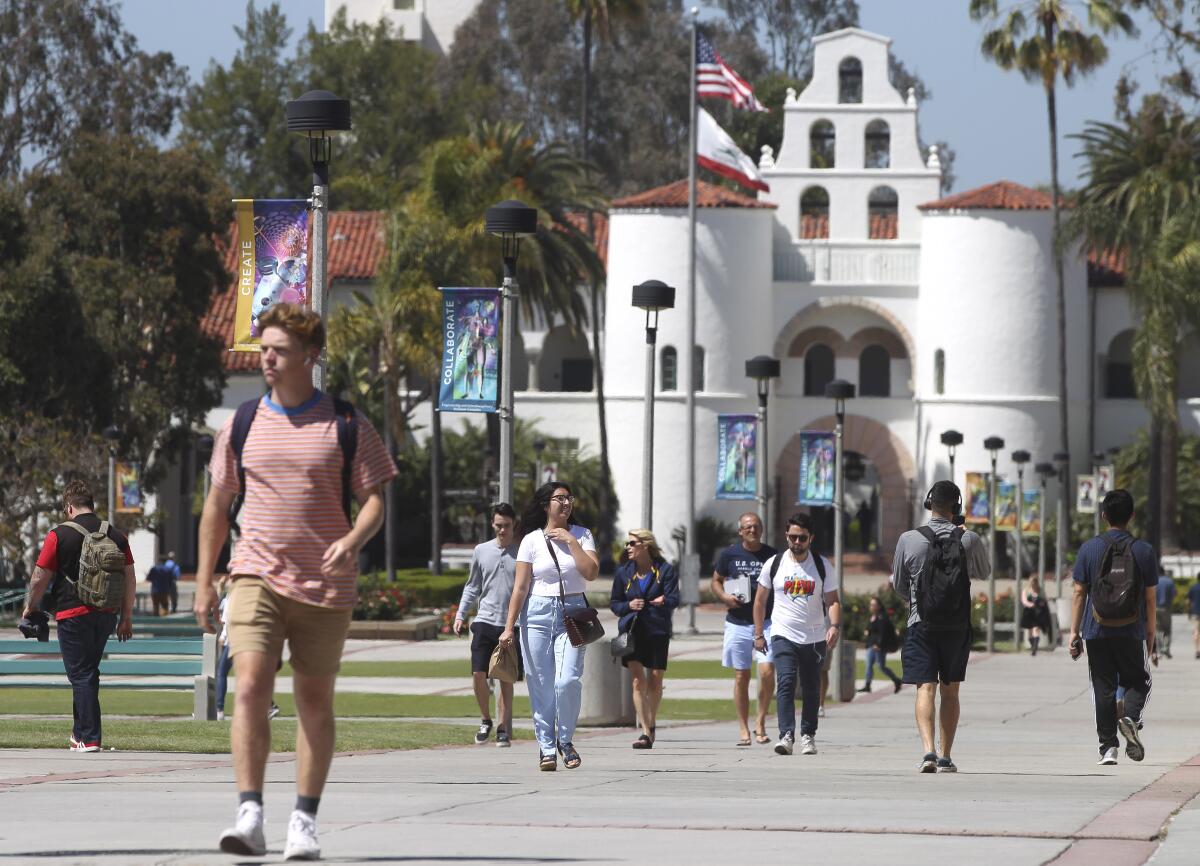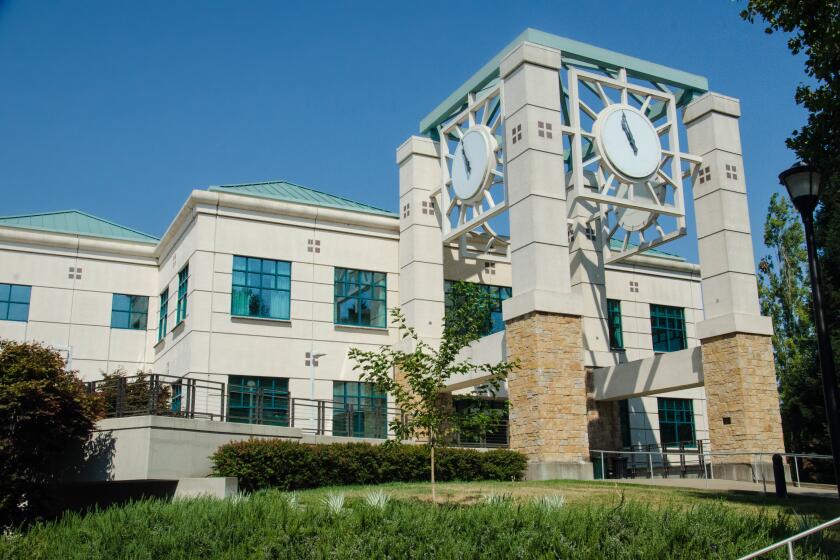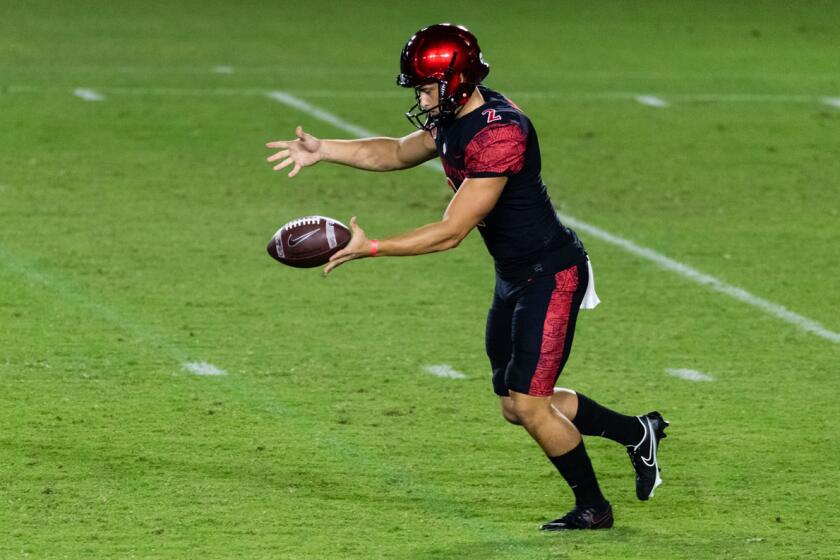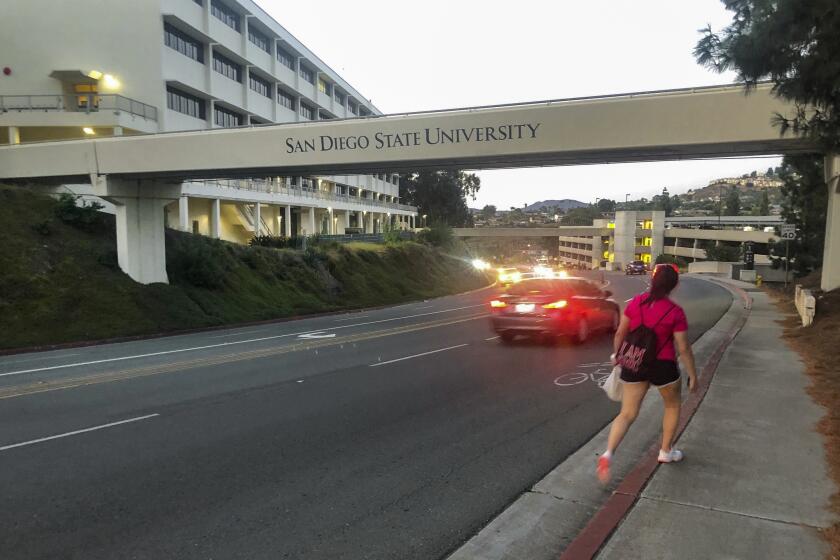San Diego State has given conflicting, shifting accounts of how it handled gang rape allegation

Since allegations of a gang rape became public months ago, San Diego State University officials have provided shifting and conflicting accounts about how they responded after a star football player and his teammates were first accused of assaulting a 17-year-old high school senior at an off-campus party.
Top administrators have refused to answer some questions about their actions and have mischaracterized key facts about the universityâs response, acknowledging critical details only after disclosures by The Times and other media.
San Diego State President Adela de la Torre has defended the decision to hold off alerting the campus community for more than seven months or conducting an internal inquiry when the incident was first reported to the university last October. She has said that officials did not want to interfere with the San Diego Police Departmentâs criminal investigation and that federal law prevented the university from alerting the student body and campus employees â a claim legal experts dispute.
SDSU repeatedly asserted that San Diego police had not confirmed the identity of the victim and that she had not come forward to the school, but officials later acknowledged that a relative of the teen had reported the alleged assault within days.
Last week, the university said in a statement to The Times that it had âconfirmed multiple timesâ that its campus Police Department soon âbecame aware of the victim â including the name of the victim â and alleged assault.â Yet the university has not acknowledged that it knew the name of the girl in any public statements on its website, which states that âwe did not know their identity.â
Students, faculty and experts, including an advocate for sexual assault victims who has worked with San Diego State athletes, say the universityâs statements, and its failure to acknowledge missteps, have undermined public confidence in its ability to protect the campus community.
Recent revelations about how California State University handled sexual harassment and workplace retaliation complaints have rocked the nationâs largest four-year public university system.
âTheyâre not truly holding themselves accountable,â said Brenda Tracy, a gang rape survivor whom SDSU brought in to provide sexual assault prevention training for the football team after the incident but who was not told what had allegedly happened. âIf someone is defensive and saying, âWe didnât do anything wrong,â then thereâs no hope that theyâre going to do differently in the future. And I think that is really sad and unfortunate.â
The university said that it increased awareness training for all athletes while it complied with the police investigation. In its statement, SDSU reiterated that speaking to any individuals who may have been involved or taking actions such as âprematurely activating communicationsâ could have weakened the criminal case â which âwould be the ultimate miscarriage of justice.â
The revelations have come as California State University trustees â who oversee the systemâs 23 campuses â are facing their own questions of public trust after recent sexual harassment scandals led to the resignation of top CSU officials and sparked outcry for greater transparency. The crisis has embroiled a number of campuses in the nationâs largest public four-year university system, including ones in Fresno, San Jose, Sonoma and San Marcos.
Criticism of San Diego Stateâs response began in June after a Times investigation revealed the university had not alerted the campus or launched its own investigation after receiving reports in October 2021 that football players had allegedly raped an unconscious girl and left her bloodied and bruised at a house party off campus.
In response to the news report, De la Torre sent a message June 3 to the campus community about the alleged assault; the university simultaneously launched a webpage with a general description about the allegation, information about the schoolâs communication with police and guidance on how to report a sexual assault.
She said the San Diego Police Department, which began a criminal investigation after the teen filed a report, had asked the university not to take any action because it could compromise the investigation. The university complied â a decision that has been criticized by faculty, students and some legal experts.
In her message, De la Torre also said that because the alleged sexual assault occurred off campus, âWe are legally restricted from issuing a Clery Timely Warning about incidents outside of our jurisdiction,â referring to the federal law that requires universities to issue notifications about sexual assault, rape and other crimes reported on campus property.
A womanâs lawsuit alleges that Matt Araiza, now with the Buffalo Bills, and two San Diego State football players raped her when she was 17.
A spokesperson for the U.S. Department of Education, which enforces the Clery Act, said in a written statement to The Times: âA school may issue timely warnings for crimes occurring outside a schoolâs Clery geographic boundaries.â
Legal experts said that even if the university believed it was restricted from alerting the campus community, it could have issued a notification similar to De la Torreâs June 3 message that gave a general description about the incident.
San Diego State, for example, recently sent out a crime notification after someone threw a beverage at students and noted in the message that the university may alert the community about âincidents that occur in close proximity to campus that may pose a safety risk.â
De la Torre has declined repeated interview requests regarding her response to the incident. Citing the ongoing police and university investigations into the rape allegation, school spokeswoman La Monica Everett-Haynes said last week that the president âis not scheduling media interviews at this time.â
In a harshly worded open letter to De la Torre published in the Daily Aztec, the student-run campus newspaper criticized her response.
âThe lack of transparency has amplified the distrust students feel about administration,â the Sept. 15 opinion piece said. âStudents have said your responses are insufficient â and they are right.â
The sentiment is shared by others on campus. Emma Sidell, a senior studying journalism, said she has been disappointed by the lack of transparency and statements from the university that she described as âconcerning, and obviously contradictory to some of the statements from the media that we obviously all have access to.â
The universityâs handling of the issue, she said, has undermined her faith that the school will protect the campus community and left her concerned about the well-being of future students.
San Diego State University held off investigating at the request of police, who say their inquiry into the alleged October incident involving a minor is ongoing.
In August, a civil lawsuit filed in state court accused three past San Diego State University football players â including former NFL punter Matt Araiza â of raping the girl, who said she was heavily intoxicated and at some points drifted in and out of consciousness. Araizaâs attorney has denied the accusation and called the lawsuit a âshakedown.â
Before the lawsuit was filed, school officials stressed in repeated communications to the media and campus community, including senior staff who were asked to forward messages to donors and stakeholders, that the university did not receive any information from San Diego police confirming the names of the girl or the football players involved in the alleged rape, which occurred during a Halloween party at a private residence.
On July 28, KFMTB-TV Channel 8 reported that the teenâs father had contacted the university shortly after the Oct. 17 incident. In a separate interview with The Times, he said he drove to the school two days after the alleged assault and told campus police that football players had raped his daughter. He said he provided his name and contact information and his daughterâs name. He said he expected the campus would have investigated sooner.
On the same day CBS 8 aired its interview, San Diego State updated its webpage acknowledging that a ârelative of the alleged victimâ had visited university police and told them âthat a report had been made to the San Diego Police Department.â
In an update several days later to the campus community, De la Torre said that the girl requested confidentiality and that âofficers were legally restricted in sharing the name and identity of the victim and details of the case.â
âShortly after the launchâ of the criminal investigation, De la Torre said in her update, the school had provided information through police to the alleged victim informing her about the campus investigative process. The teen, De la Torre said, âchose not to contact the university.â
Officials have not explained why campus police did not provide the father with information about the internal complaint process and contact information for school officials who investigate sexual misconduct, as required by CSU policy.
The university official who oversees sexual misconduct investigations, Jessica Rentto, formally asked San Diego police in a Dec. 7 letter to share campus complaint information with the teenager â more than seven weeks after the incident and three days after the football team played in the Mountain West Conference championship.
At the time, the Aztec football squad was finishing its best season in years and basking in accolades for Araiza, an All-American punter who won top awards and set several NCAA records.
Internal campus records reviewed by The Times show Araizaâs name surfaced in connection with the rape allegation in at least one report made by student-athletes in late October through an anonymous campus reporting portal that was monitored by Rentto and Jenny Bramer, the schoolâs executive associate athletic director.
Itâs not clear what Bramer and Rentto did with that information. Football coach Brady Hoke said at a recent news conference that he was unaware the star punter was connected to the allegations until he was named in the lawsuit in August. Hoke, Bramer and Rentto have not responded to requests from The Times for comment.
During the news conference, Athletics Director JD Wicker dismissed the information from student-athletes as âanonymous reports, hearsay, gossip, whatever.â He and Hoke walked out of the event as reporters pressed for answers about the universityâs response to the accusations. Wicker later returned and spoke about the allegations.
In a previous statement to The Times, De la Torre said that âwe remain confident in the criminal investigation.â She has repeatedly told the campus that delaying an internal investigation was the only way to ensure justice for the teen who accused the players of rape.
The university is now conducting its own investigation, but some of its communications about the events that led up to the launch of that inquiry have been misleading.
Josh Mays, an associate vice president who oversees campus public safety, said twice in emails to Times reporters that it was âabsolutely falseâ that he initially told university officials in October 2021 that the campus had waited too long and needed to investigate. At the time, he was campus police chief.
But records reviewed by The Times show that Mays sent an email to Rentto on Oct. 27 â about a week after the incident â urging her to conduct an investigation. âI suspect your team may be able to gather info that will only help SDPD. We have stood by long enough.â
The next day, San Diego police sent a letter formally asking the university to temporarily delay its investigation to avoid compromising the criminal inquiry.
Later, the university waited nearly a week to inform the public that it had begun its own investigation. It did so in July, on the same day CBS 8 reported that police notified the school a week earlier that doing so would no longer compromise the criminal inquiry.
Araiza, who was cut by the Buffalo Bills after the lawsuit became public, and the other two former San Diego State football players named as defendants in the lawsuit are no longer students at the university and will not be subject to any campus disciplinary process.
Faculty members who spoke to The Times expressed disappointment in the universityâs response to the allegations, calling it inadequate and lacking in resolve.
âI donât think that they could have handled it any worse,â said Peter C. Herman, a professor of English literature who recently wrote an opinion piece for the Times of San Diego â an independent news site â arguing that the response by De la Torre and the university has âmagnified the story to the point where itâs now a major scandal.â
Tracy, the advocate for sexual assault survivors, said San Diego State officials are confronted with the very situation she urged them to avoid.
âYou need to do the right thing and not be reactive,â she recalled telling officials. âThe days of sweeping things under the rug are over.â
More to Read
Sign up for Essential California
The most important California stories and recommendations in your inbox every morning.
You may occasionally receive promotional content from the Los Angeles Times.















